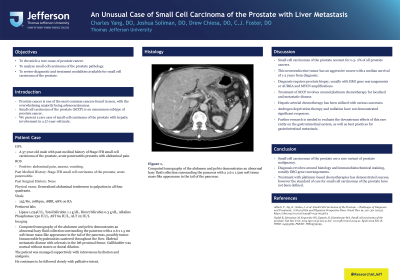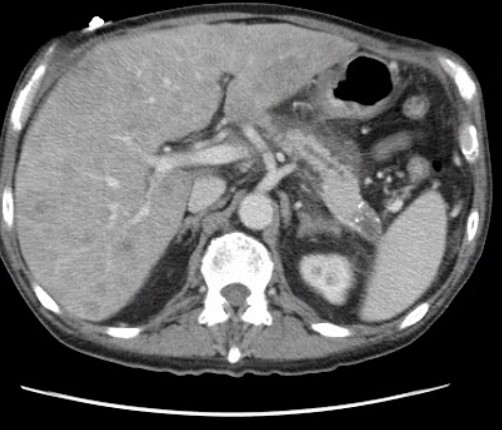Monday Poster Session
Category: Liver
P2990 - An Unusual Case of Small Cell Carcinoma of the Prostate With Liver Metastasis
Monday, October 28, 2024
10:30 AM - 4:00 PM ET
Location: Exhibit Hall E

Has Audio

Charles Yang, DO
Thomas Jefferson University
Cherry Hill, NJ
Presenting Author(s)
Charles Yang, DO1, Joshua Soliman, DO1, Drew Chiesa, DO2, C.J Foster, DO1
1Thomas Jefferson University, Cherry Hill, NJ; 2Jefferson Health, Washington Township, NJ
Introduction: Prostate cancer is one of the most common cancers found in men, with the overwhelming majority being adenocarcinomas. Small cell carcinoma of the prostate (SCCP) is an uncommon subtype of prostate cancer. We present a rare case of small cell carcinoma of the prostate with hepatic involvement in a 57-year-old male.
Case Description/Methods: A 57-year-old male with past medical history of Stage IVB small cell carcinoma of the prostate, acute pancreatitis presents with abdominal pain. He reports alcoholic abstinence for the past six months. Admission vitals were significant for blood pressure of 135/80, heart rate 108bpm, respiratory rate 18, oxygen saturation 98% on room air. Physical exam was notable for generalized abdominal tenderness without guarding or rebound. Labs were significant for lipase 1,034U/L, total bilirubin 1.1 g/dL, direct bilirubin 0.3 g/dL, alkaline phosphatase 230 IU/L, AST 69 IU/L, ALT 22 IU/L. Computed tomography of the abdomen and pelvis demonstrates an abnormal hazy fluid collection surrounding the pancreas with a 2.6 x 1.5 cm soft tissue mass-like appearance in the tail of the pancreas, possibly tumor. Innumerable hypodensities scattered throughout the liver. Skeletal metastatic disease with sclerosis in the left proximal femur. Gallbladder was normal without stones or ductal dilation. The patient was managed supportively with intravenous hydration and analgesia. He continues to be followed closely with palliative intent.
Discussion: Small cell carcinomas of the prostate account for 0.5- 2% of all prostate cancers. This neuroendocrine tumor has an aggressive course with a median survival of 1-2 years from diagnosis. Diagnosis requires prostate biopsy, usually with ERG gene rearrangements or AURKA and MYCN amplifications. Treatment of SCCP revolves around platinum chemotherapy for localized and metastatic disease. Hepatic arterial chemotherapy has been utilized with various successes. Androgen deprivation therapy and radiation have not demonstrated significant responses. Further research is needed to evaluate the downstream effects of this rare entity on the gastrointestinal system, as well as best practices for gastrointestinal metastasis.

Disclosures:
Charles Yang, DO1, Joshua Soliman, DO1, Drew Chiesa, DO2, C.J Foster, DO1. P2990 - An Unusual Case of Small Cell Carcinoma of the Prostate With Liver Metastasis, ACG 2024 Annual Scientific Meeting Abstracts. Philadelphia, PA: American College of Gastroenterology.
1Thomas Jefferson University, Cherry Hill, NJ; 2Jefferson Health, Washington Township, NJ
Introduction: Prostate cancer is one of the most common cancers found in men, with the overwhelming majority being adenocarcinomas. Small cell carcinoma of the prostate (SCCP) is an uncommon subtype of prostate cancer. We present a rare case of small cell carcinoma of the prostate with hepatic involvement in a 57-year-old male.
Case Description/Methods: A 57-year-old male with past medical history of Stage IVB small cell carcinoma of the prostate, acute pancreatitis presents with abdominal pain. He reports alcoholic abstinence for the past six months. Admission vitals were significant for blood pressure of 135/80, heart rate 108bpm, respiratory rate 18, oxygen saturation 98% on room air. Physical exam was notable for generalized abdominal tenderness without guarding or rebound. Labs were significant for lipase 1,034U/L, total bilirubin 1.1 g/dL, direct bilirubin 0.3 g/dL, alkaline phosphatase 230 IU/L, AST 69 IU/L, ALT 22 IU/L. Computed tomography of the abdomen and pelvis demonstrates an abnormal hazy fluid collection surrounding the pancreas with a 2.6 x 1.5 cm soft tissue mass-like appearance in the tail of the pancreas, possibly tumor. Innumerable hypodensities scattered throughout the liver. Skeletal metastatic disease with sclerosis in the left proximal femur. Gallbladder was normal without stones or ductal dilation. The patient was managed supportively with intravenous hydration and analgesia. He continues to be followed closely with palliative intent.
Discussion: Small cell carcinomas of the prostate account for 0.5- 2% of all prostate cancers. This neuroendocrine tumor has an aggressive course with a median survival of 1-2 years from diagnosis. Diagnosis requires prostate biopsy, usually with ERG gene rearrangements or AURKA and MYCN amplifications. Treatment of SCCP revolves around platinum chemotherapy for localized and metastatic disease. Hepatic arterial chemotherapy has been utilized with various successes. Androgen deprivation therapy and radiation have not demonstrated significant responses. Further research is needed to evaluate the downstream effects of this rare entity on the gastrointestinal system, as well as best practices for gastrointestinal metastasis.

Figure: Computed tomography of the abdomen and pelvis demonstrates an abnormal hazy fluid collection surrounding the pancreas with a 2.6 x 1.5 cm soft tissue mass-like appearance in the tail of the pancreas
Disclosures:
Charles Yang indicated no relevant financial relationships.
Joshua Soliman indicated no relevant financial relationships.
Drew Chiesa indicated no relevant financial relationships.
C.J Foster indicated no relevant financial relationships.
Charles Yang, DO1, Joshua Soliman, DO1, Drew Chiesa, DO2, C.J Foster, DO1. P2990 - An Unusual Case of Small Cell Carcinoma of the Prostate With Liver Metastasis, ACG 2024 Annual Scientific Meeting Abstracts. Philadelphia, PA: American College of Gastroenterology.
